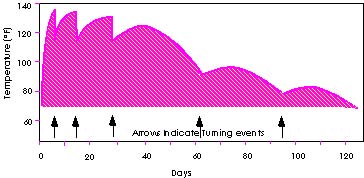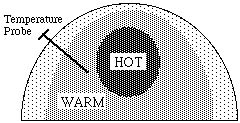

As organisms decompose waste, they generate heat. Decomposition is most rapid when the temperature is between 90° and 140° F (32 - 60° C). Below 90° F (32° C), the process slows considerably, while above 140° F (60° C) most microorganisms cannot survive. Compost pile temperature depends on how the heat produced by microorganisms is offset by the heat lost through aeration or surface cooling. During periods of extremely cold weather, piles may need to be larger than usual to minimize surface heat loss. When composting high nitrogen wastes, like grass clippings in the summer, smaller piles and frequent turning are needed to both provide oxygen and release excess heat.

The above is a graph of typical compost temperatures. After an initial high temperature period (of a few days to several weeks), compost pile temperatures will gradually drop. Turning the compost rejuvenates the oxygen supply and exposes new surfaces to decomposition, causing temperatures to rise. If temperatures rise above 160° F (71° C), the compost can sterilize itself, killing off the beneficial microorganisms. Extremely high temperatures can also start the chemical process of spontaneous combustion, which might lead to the outbreak of a fire. Turning the compost when temperatures exceed 140° F (60° C) can prevent both these potential problems.
When the temperature drops below 70° F (21° C), the composting process is nearly complete. However, it is also possible that imbalances of oxygen or moisture are causing the pile to cool. If the compost is properly moist, and turning does not cause temperatures to rise, the compost is probably finished.
Temperature monitoring is very important for managing the compost process. By measuring temperatures regularly, you can tell how fast material is composting, and whether there are hot or cold spots in the pile. Turning the compost whenever temperatures get above or below the optimum range will help produce high quality compost in the shortest possible time.

|
|
|---|
|
Composting |
Engineering |
in Schools |
|
For specific comments related to this page, please contact
the Cornell Waste Management
Institute (format and style), or Tom
Richard (technical content).
This page was created on August 24, 1995
This page was last updated October 2000